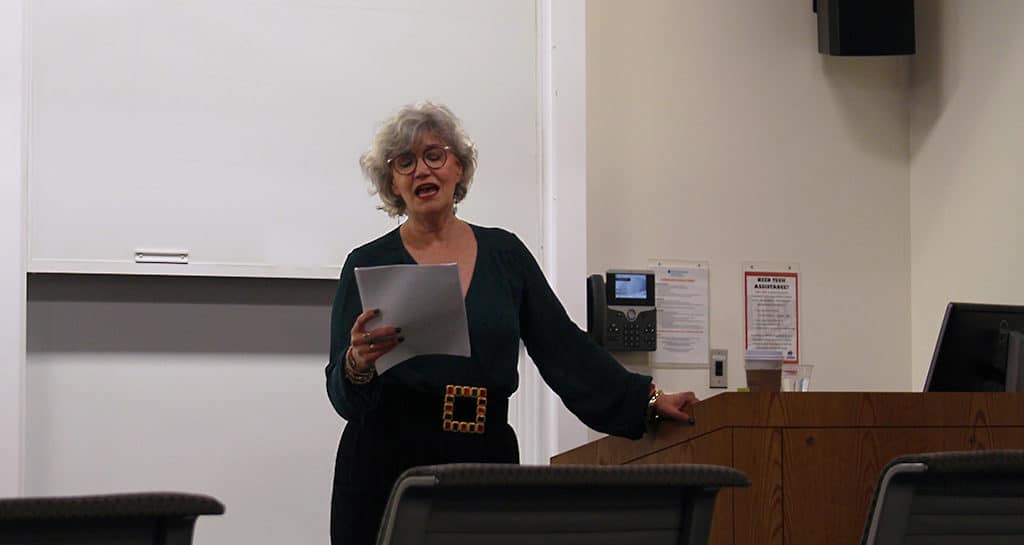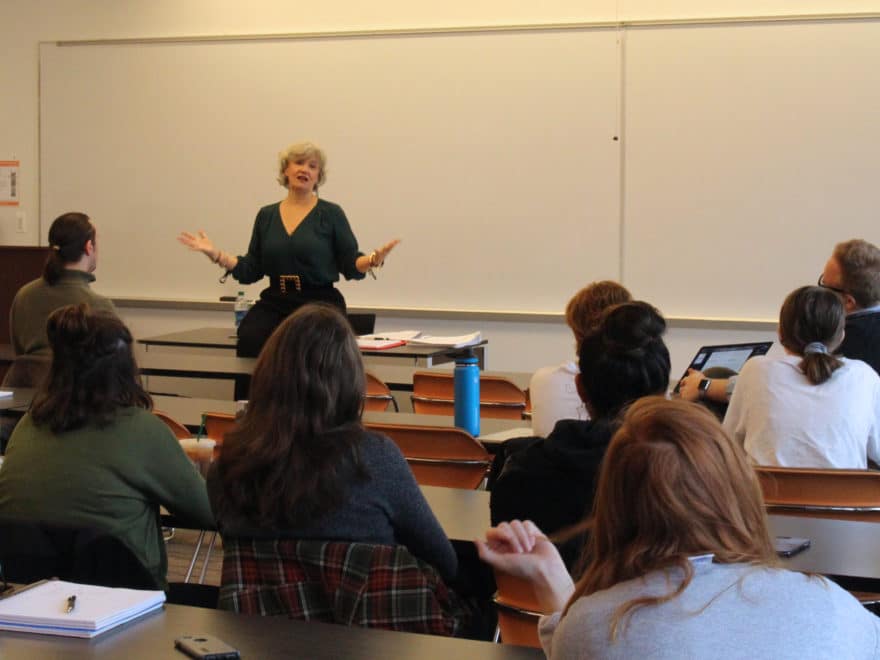On October 22, the WRD Department hosted Dr. Frankie Condon for its quarterly Writing & Rhetoric Across Borders Speaker Series. Dr. Condon, an Associate Professor at the University of Waterloo, led both a workshop and a talk that centered around her research interests in critical race theory, critical pedagogy, and writing center studies.
Earlier in the day, Dr. Condon hosted her workshop on anti-racism, asking attendees to reflect on and assess the racial ideologies present in themselves and their workplaces. The workshop participants included WRD faculty, first-year writing teachers, and tutors and administrators from The University Center for Writing-based Learning (UCWbL). With direction from Dr. Condon, each group determined the need to continue developing anti-racist systems in their respective areas.
Dr. Condon opened the workshop with a short talk and made a point to clarify that the workshop was not anti-racist training. She argued that it is a fallacy to believe racism can be solved since people inherent racism from their cultures. Because of this, cultivating a strong resistance to racist ideology takes time and effort to properly nurture. As such, our efforts are best put to methodically building that resistance within our places of work. Racism, explained Dr. Condon, is ultimately larger than us, but we can push against it by beginning at the personal level. “You can’t change others until you change yourself,” she said.
During the workshop, participants explored two anti-racists frameworks. The first model represented stages of multicultural identity development, with a version for minority member awareness and a version for majority member awareness. The second model was a linear spectrum for ranking your institution’s status as anti-racist and multicultural.
Participants had much meaningful discussion throughout the workshop, with Dr. Condon not shying away from making critical comments about the institutions. At one point, she explained that the workshop would typically involve separating larger groups into a racial majority and a racial minority. However, there was simply not enough racial representation present to form these groups. Dr. Condon commented that, simply put, our institutions need more diversity.

After the workshop, Dr. Condon held a talk titled “And the World Won’t End: Rewriting the Racial Imaginary in the Writing Centre and Writing Classroom.” During the talk, Dr. Condon invited attendees—teachers of writing, tutors of writing, and scholars of rhetoric—to question the historical and ideological bases for the racial imaginations embedded in higher education.
As Dr. Condon explained, anti-racist pedagogical practices emerge from an ongoing recognition of and resistance to racism in higher education. Though reflective of the larger society, the education system has been built on assumptions and biases that disadvantage some students.
Many pedagogical practices, said Dr. Condon, are predicated on monolingualism and the epistemological normalcy attributed to academic English or Standard American English, which often positions some students as “other.” These monolingual worldviews seem to promote the idea that there is one academic or “normal” discourse that students should use, which limits their possibilities for being while maintaining the social order. As Dr. Condon asserted,
“A racialized society cannot have the racially oppressed without the racial oppressor.”
So what can teachers, tutors, and students do when contending with the notion that racism is real? Dr. Condon encouraged those with anti-racist standpoints to band together, affiliate, and become accomplices with each other, working together to stand against everyday instances of racism. Even as the existing racial imaginations stand, they can be undone through self-reflection and action, beginning perhaps with asking yourself, “where did you learn to tolerate injustice?
Those with anti-racist standpoints can constantly push back against the notion that there is only one language (or only one English) in which knowledge can be produced. Rather than monolingual worldviews, teachers can help their students communicate in a variety of discourses, recognizing the many ways of knowledge production that differ from the master monolingual narrative.
Through awareness and self-consciousness, teachers can forge informed, self-reflexive solidarities and work together toward more liberatory pedagogies. A deep-seated racial unconsciousness may inform the rules of racial understanding that dictate racial imaginations in higher education. But these embedded injustices can be undone. Through critical engagement and reflective pedagogical practices, teachers and tutors can begin to notice racialized thinking, an essential step toward more just and equitable education for all:
“There is no recipe for liberatory pedagogy. We will always be making the way as we are walking.”
